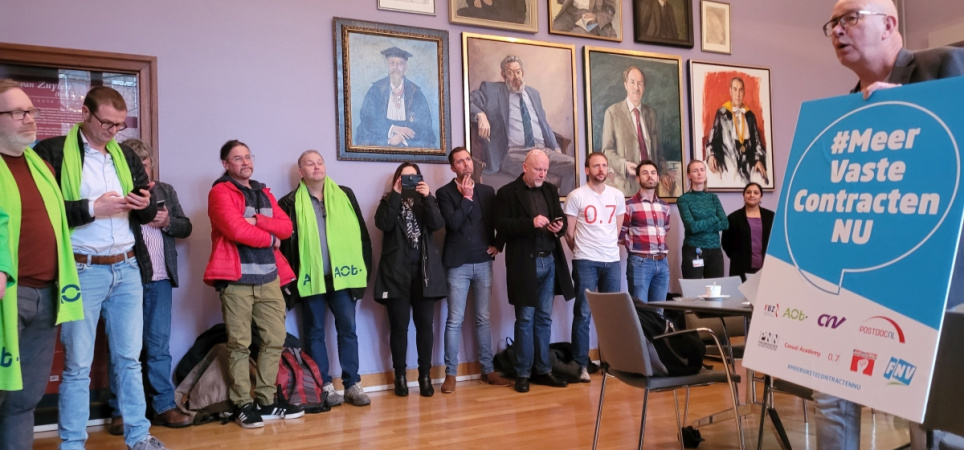Unions demand more permanent jobs at universities
During a short action in Utrecht, the trade unions presented their commitment to a new collective labor agreement this afternoon. Inflation compensation is important in this, but also: more permanent contracts.

Statue: AOb
Donald Pechler of the AOb: "Everything in our joint efforts is aimed at helping academic staff find permanent employment as quickly as possible."
Vulnerable disposable personnel
Lecturers and researchers earn permanent contracts at the universities, says Pechler. "They are now simply dismissed as disposable personnel after a certain period of time, even though they have demonstrated that they function well. That is obviously not good for them, but also not good for science because of the loss of talented scientific personnel."
Education and research are public and structural tasks for the universities, which should therefore be incorporated into permanent employment contracts, according to de AOb. Pechler: "Unfortunately, studies show time and time again that teachers and researchers have an extra job because of their temporary employment vulnerable position to take. Think of work pressure, unpaid overtime and social safety."
If it is up to the trade unions, the following collective labor agreement therefore states:
- A salary increase that preserves purchasing power. The annual inflation over the period October 2021 to October 2022 was 14,3 percent, according to Statistics Netherlands.
- Agreements for more and faster permanent contracts, especially for researchers and teachers. The unions demand maximum percentages for temporary contracts. For lecturers, this amounts to 15 to 25 percent per faculty. In original bet you can read exactly how the different functions and types of appointments are converted to permanent employment more quickly and more often.
- Appointments that reduce the workload. For teachers, this can be done, for example, through better agreements about how much education they have to teach.
- Full employment contracts for teachers who do this as a main occupation. So no 0,6 or 0,7 FTE appointment that is too small in practice to do the work.
- Dat secondment is only allowed for support staff. Scientific staff must always have an employment contract with the university itself, even when it comes to 'sick and peak'.
- That one national ombudsman reporting point must come for people who are afraid to report to an ombuds officer of their own institution.
- And about diversity and inclusion: that there will be a transgender leave and a leave for women in transition, among other things.
Five action groups*Casual Academy, WOinActie, PNN, Postdocnl and 0.7 and the trade unions AOb, FNV, CNV and FBZ, together accounting for about 25 people present, handed the employers the deployment this afternoon, together with a foam board with the statement 'More permanent contracts NOW', a nod to the new name of what used to be called the VSNU: the Dutch Universities (NU).

Through the red wristband you can show colleagues that you show solidarity and that more permanent contracts are important.
The joint petition calling for an end to temporary contracts at universities and research institutions has now been signed more than 1400 times, Jan Boersma, negotiator for the FNV, said: "Universities have been using the loyalty and intrinsic drive of their employees for years. are."
Research
In the current collective labor agreement, which runs until the end of March, it has been agreed that research will be carried out into the appointments of lecturers and PhD candidates at Dutch universities. That research is not yet complete. Unfortunately, according to Pechler of the AOb. "We want that data. We have formulated the research question clearly and together with the employers. Knowing the facts is crucial for this negotiation."
The negotiation process officially starts today. Approximately 60.000 people at fourteen Dutch universities and research institutions fall under this collective labor agreement.


